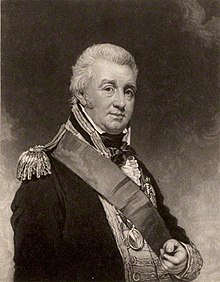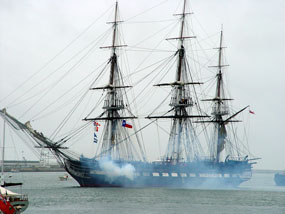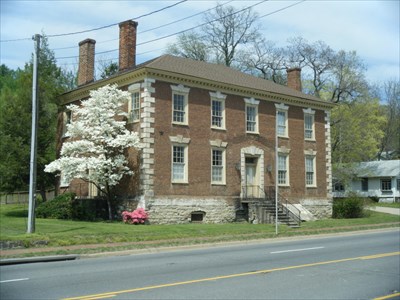Arrival of Admiral Cochrane with a strong force (mentioned below) at Bermuda.
 |
| Vice-Admiral Alexander Cochrane, HMN. Wikipedia image |
It is
reported but upon what authority we are no able to say that our government has
signified its determination to listen to no further terms of accommodation whatever
of AMERICA, but is bent upon prosecuting the war with the most rigid severity.
Sunday
ar. H. M. ship Asia, 74,[1]
Vice Admiral Sir Alex. Cochrane, K. B. hon. Captain Paget, and Superb, 74,[2] Captain
Wainwright, from England, Majestic,[3]
Captain Hayes, and Sophia,[4]
Captain Lockyer, from a cruise[].[5]
------
A large British force coming to America
London,
Jan. 31.
Preparations
have been made on a a [sic} large scale to
enable Sir A. Cochrane, to take with him a very large force, both naval and
military.
Sir
Alexander takes with him about 4000 Marines, under the immediate command of
Major Nickols. Sir Alexander will also
take with him a strong body of riflemen and battering artillery, Congreve Rockets,
shrapnell [sic] shells, with all the ammunition &c: necessary to give
effect to these engines of destruction.[6]
 |
| Congreve rocket - See Note below Science Museum/Science & Society Picture |
------
Capture of another
French Frigate.
The
Majestic has brought in the fine new French frigate Terpsichore, of 44 guns and 300 men, captures the 2d February off
the Western Islands, after a slight resistance, having 2 killed and 2 wounded,
sails and rigging much shattered. The
Terpsichore was in company with the Atalanta frigate, which sailed in co. from L'Orient
(then 23 days out) & and Indiaman.
The Majestic gave chase to them, and in about 5 hours came ip with the
Terpsichore, and captured her, and the Atalanta made all sail and escaped with
the Indiaman. They had captured the day
previous a Spanish vessel from Lima with specie and a valuable cargo.[7]
------
Of
the Constitution Frigate.
Barbadoes
[sic], Feb. 17.
This
morning arrived schr. Lovely-Ann, from Bermuda, bound to Surinam.
She was
captured Sunday evening last by the American Frigate Constitution,[8]
Capt. Stewart, about 300 miles to the windward od this Island, and sent here,
with an American Midshipman on board, as a cartel, having previously received
the officers and crew of his majesty's schr. Pictou,[9]
also from Bermuda, that had been captured on the Monday following by the said
frigate and burnt. Last evening the
cartel fell in with the Venerable 74,[10]
and two other British cruisers, about 120 miles to the windward, to whom they
gave the intelligence. The Venerable
immediately went in chase, and the probability is that she will fall in with
her. The Constitution left Boston the
last of Dec. but had made no other captures.
 |
| USS Constitution National Park Service |
The
letter of marque brig. Argus- Howe,[11]
of Boston, 4 days out from Savannah was captured by the San Domingo, 74,[12]
and arrived at Bermuda about the 7th Feb.
About
6000 troops were daily looked for at Bermuda, (from, England,) 13th inst.[13]
______
Mr. Topliff has conversed with a gentleman from Bermuda, who
favored him with the papers. He informed
him that [ ] ships of the line, 3 frigates . and 2 sloops of war, were at
Bermuda 13th inst. that 500 Americans were there in a distressed situation, and
it was expected they would be sent to England.
It was stated in Bermuda that Ad. Cockburn had asserted that in the
ensuing summer the Yankees would be made to feel what it was to be at war with
England. Some ports in the U, States
were to be bombarded in the spring.
It was
said that from 10 to 15 sail of the line were coming out to join Admiral
Cochrane. The Sandomingo [sic] was
expected about the 20th inst. at bermuda, when Admiral Warren would return her
to England. Admiral Cochrane would then
take commend of the Bermuda and Halifax stations.
Flour at
Bermuda was 20 dollars plenty[14] -
Beef 20 - 22 dollars - Pork scarce - Corn 2 dollars bush. Fresh provisions not to be had at any price. [15]
[1]
HMS Asia was a 74-gun third rate ship of the line of the Royal Navy. In the
British Royal Navy, a third rate was a ship of the line which from the 1720s
mounted between 64 and 80 guns, typically built with two gun decks (thus the
related term two-decker). Years of experience proved that the third rate ships
embodied the best compromise between sailing ability (speed, handling),
firepower, and cost. So, while first rates and second rates were both larger
and more powerful, the third-rate ships were in a real sense the optimal
configuration. HMS Asia was off Chesapeake Bay in July 1814. The Royal Marine
Artillery company of the 3rd Battalion, Royal Marines were ferried from Bermuda
to the Chesapeake aboard HMS Asia, via HMS Tonnant. During the bombardment of
Fort McHenry, Asia was moored off Baltimore, along with HMS Seahorse, Severn
and Surprise. HMS Asia was among Admiral
Alexander Cochrane's fleet moored off New Orleans at the start of 1815. In support of the attack on New Orleans, 107
Royal Marines from Asia were disembarked. From Wikipedia.
[2]
HMS Superb was a 74-gun third rate ship of the line of the Royal Navy, and took
part in an attack upon Wareham, Massachusetts during the War of 1812. From
Wikipedia.
[3]
HMS Majestic was built as a 74-gun third rate ship of the line of the Royal
Navy, but was reconfigured into a 58-gun fourth-rate frigate in 1813. From
Wikipedia.
[4]
HMS Sophie was an 18-gun Cruiser class brig-sloop of the Royal Navy. During the
War of 1812 Sophie participated in the economic war against American trade,
capturing or destroying numerous small merchant vessels, and in an unsuccessful
attack on Fort Bowyer, Alabama. From Wikipedia.
[5] Alexandria Gazette Commercial and Political;
Date: 03-31-1814;Page: [2].
[6]
Alexandria Gazette Commercial and Political; Date: 03-31-1814;Page: [2].
[7]
Alexandria Gazette Commercial and Political; Date: 03-31-1814;Page: [2].
Note Congreve rocket image: Replica, shown with a soldier and two 32 lb carcass rockets in Hyde Park, London. The Bombarding Frame consisted of a ladder; two rocket troughs; two supporting legs for the ladder; a tie bar for supporting the legs and a gun bucket. The Frame would be tied to the mast of a rocket ship and the rockets fired, the trajectory being varied by altering by the slope of the ladder. Sir William Congreve (1772-1828) successfully demonstrated a solid fuel rocket in 1805, and the following year his rockets were used in action for the first time, fired from special boats against the French fleet off Boulogne. Congreve's rockets had a range of up to about 2.5 km. They were effective, despite being somewhat inaccurate and prone to explode prematurely. Image number: 10278260 Credit: Science Museum/Science & Society Picture
[8]
USS Constitution was rated as a 44-gun frigate, though she would often carry
over 50 guns at a time. http://www.history.navy.mil/ussconstitution/history.html
[9]
HMS Pictou was a 16-gun schooner built as the American privateer Syren which
was captured by the Royal Navy on 20 April 1813. Pictou was one of five British
warships captured or destroyed during the War of 1812 by the American frigate
USS Constitution. From Wikipedia.
[10]
HMS Venerable was a 74-gun third rate ship of the line of the Royal Navy. From
Wikipedia.
[11]
USS Argus was a brig in the United States Navy. From Wikipedia.
[12]
HMS San Domingo was a 74-gun third-rate ship of the line of the Royal Navy.
From Wikipedia.
[13]
Alexandria Gazette Commercial and Political; Date: 03-31-1814;Page: [2].
[14]
One dollar in 2010 approximately equal to $10.334 in 1814: http://mykindred.com/cloud/TX/Documents/dollar/index.php?cyear=2010
[15]
Alexandria Gazette Commercial and Political; Date: 03-31-1814;Page: [2].
Articles transcribed by John Peter Thompson. March 31, 2013.
Articles transcribed by John Peter Thompson. March 31, 2013.


